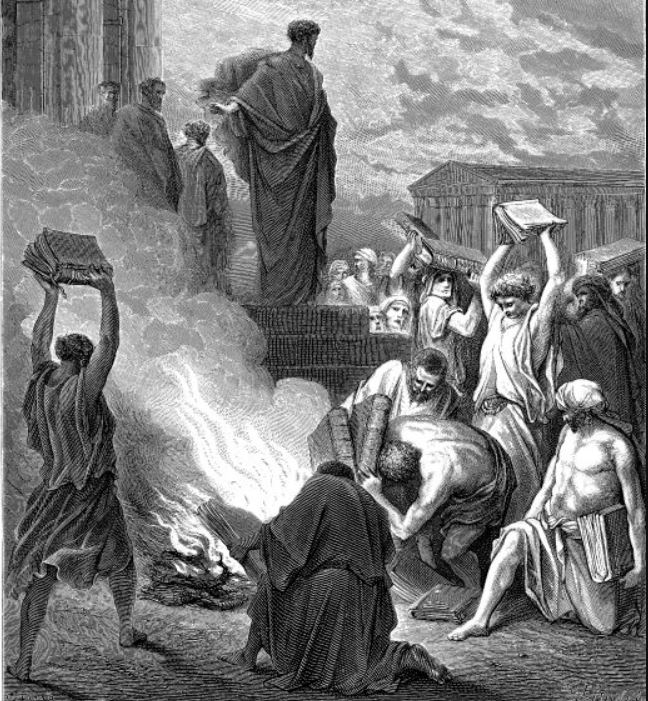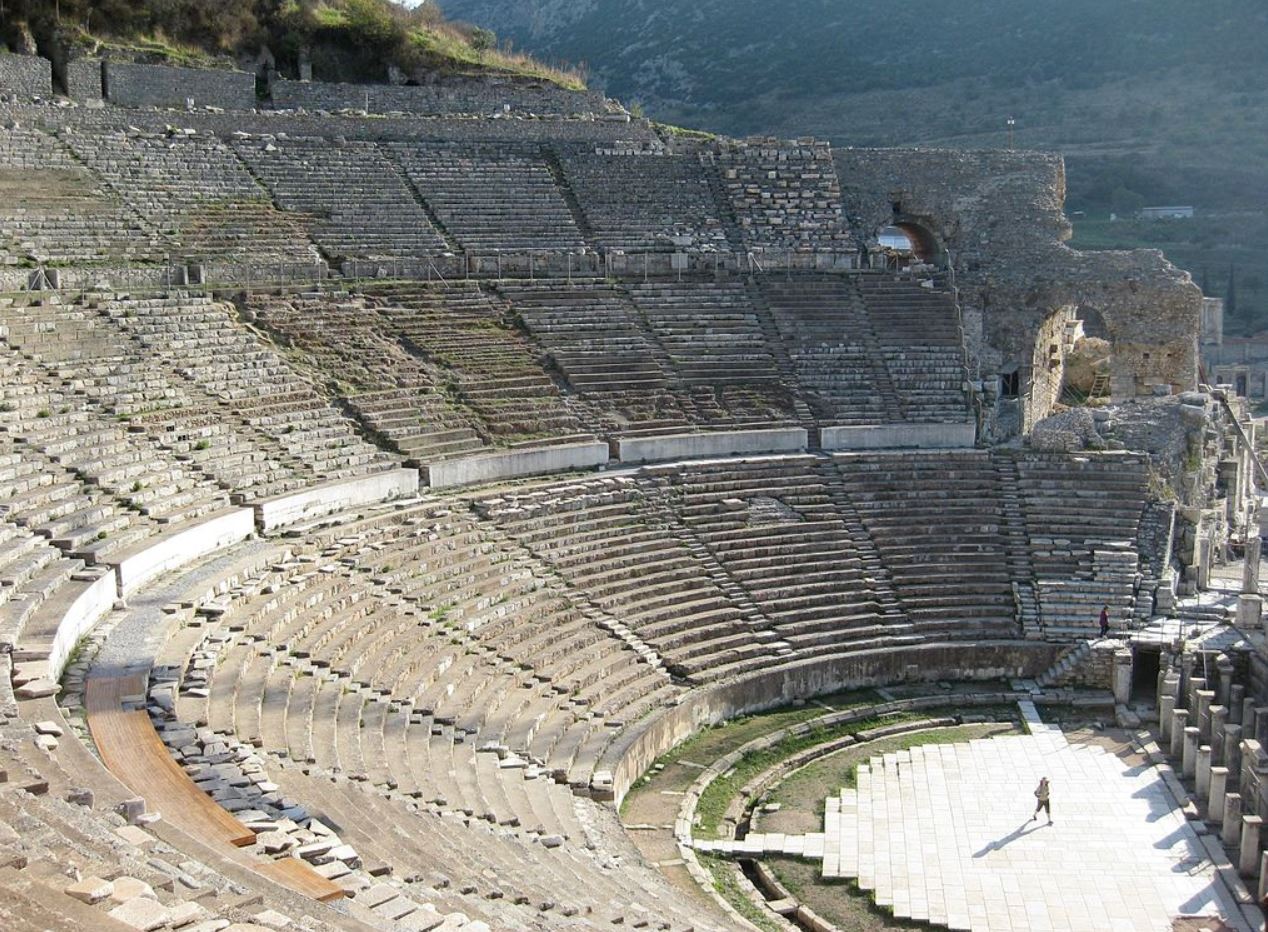

This revival account is recorded in Acts 18:23 till Acts 21:17.
Introduction
The apostle Paul, whose previous name was Saul, confessed that he had been a persecutor of the church (1 Corinthians 15:9; Acts 8:1-3). After his recorded conversion in Acts 9:1-19, he immediately began to preach that Jesus “is indeed the Son of God!” (Acts 9:20). The confirmation from the Lord of Paul’s calling as a minister of the Gospel came in Acts 9:15-16, where we read:
But the Lord said, “Go, for Saul is my chosen instrument to take my message to the Gentiles and to kings, as well as to the people of Israel. And I will show him how much he must suffer for my name’s sake.”
It was this Paul that became instrumental in spreading the Good News and starting many churches. His first two missionary journeys can be read about here:
► 48 A.D. — 1st Missionary Journey
► 49-52 A.D. — 2nd Missionary Journey
Beginning of Third Missionary Journey
At the conclusion of Paul’s second missionary journey, he made his way back to Antioch, from where he began. After spending some time there in Antioch, he set out on his third missionary journey, by first traveling through Galatia and Phrygia, “strengthening all the believers” (Acts 18:23).

Paul in Ephesus during His 2nd Missionary Journey
Paul had previously been to Ephesus during his second missionary journey, and it was the last city he visited during that trip prior to his return voyage by sea to Israel. Though he didn’t spend much time in Ephesus during that second journey, he did whet the appetite of the people for more of his teaching (Acts 18:19-21).
They asked him to stay longer, but he declined (Acts 18:20).
Initial Entry into Ephesus during Paul’s 3rd Missionary Journey
Upon Paul’s initial entry into Ephesus at this time, we read of striking spiritual manifestations that occurred. This took place when he questioned twelve believers about their reception of the Holy Spirit. When they confess that they had not received the Holy Spirit, and that these believers in Jesus had not even known that there was a Holy Spirit (Acts 19:1-2), we read the following:
Then when Paul laid his hands on them, the Holy Spirit came on them, and they spoke in other tongues and prophesied (Acts 19:6).
With that being the initial occurrence in Ephesus, it set the stage for a significant revival.
Open Door in Ephesus
During Paul’s previous travels, whenever he would enter a city, he would first visit the local synagogue and preach to the people about Jesus being the Messiah. On every occasion prior to this, the Jews rejected his message after he had only preached one or two times (Acts 13:14-52; 14:1-2; 17:1-9; 18:4-6), and in addition, they followed him during his journeys, trying to turn people against him wherever he went (Acts 17:13).
His entry into Ephesus was quite different from other cities, in that though he did experience persecution and a rejection of his message, it wasn’t till after had engaged the people in debate for three months (Acts 19:8).
It was remarkable that there was so much openness for that length of time, but when the three months expired, Paul and his message were again rejected by the Jewish leaders of that city (Acts 19:9).
One Closed Door Results in the Opening of Many More
After Paul was forbidden to speak in the synagogue, the Lord opened a much wider door, which resulted in everyone in the province of Asia hearing the Good News.
But some became stubborn, rejecting his message and publicly speaking against the Way. So Paul left the synagogue and took the believers with him. Then he held daily discussions at the lecture hall of Tyrannus. This went on for the next two years, so that people throughout the province of Asia—both Jews and Greeks—heard the word of the Lord (Acts 19:9-10).
Unusual Miracles
Throughout the New Testament, the Holy Spirit has stated that signs, wonders, and miracles will accompany the preaching of the Good News (Mark 16:20; John 5:36; Acts 1:8; 2:22; 4:30; 4:33; 10:38; 14:3; Romans 15:19;.1 Corinthians 2:4;.I Thessalonians 1:5; Hebrews 2:4). So, it is to be expected that these special miracles that Paul experienced were a normal part of his ministry (Acts 19:11-12;.2 Corinthians 12:11).
Paul’s Reputation for Casting Out Demons
Paul’s reputation for having the ability to cast demons out of people was very well known, for we see in Acts 19:13-17 that the non-believing Jews attempted to use his same method, but with failed results.

Burning of Occult Books – Estimated at Several Million Dollars
Revival in Ephesus
The move of the Holy Spirit was so powerful that it produced the following results throughout the city of Ephesus:
► The fear of God spread through the city, resulting in honor being given to Jesus (Acts 19:17).
► Public confessions of sins were made (Acts 19:18).
► Many burned their occult books, valued at several million dollars (Acts 19:19).
► The Word of God spread widely, producing powerful results (Acts 19:20).

25,000-seat theater in Ephesus – Acts 19:29
Riot in Ephesus
With the large number of pagans turning to Christ, the silversmiths, who had been profiting off the manufacture of idols previously worshiped, raised a mob in opposition to Paul. The uproar caused some concern, but no noticeable harm was done to bring the revival to an end (Acts 19:23-41).
Raising the Dead in Troas
Following his ministry time in Ephesus, Paul made his way through Macedonia and Greece, then he began his return trip to Syria (Acts 20:1-3). It was on this return trip that he made a stop in the coastal town of Troas. It was here that raising of the young man, Eutychus, occurred (Acts 20:5-12).
Jerusalem and the End of the Missionary Journey
The remaining events during Paul’s 3rd missionary journey involved stopping at various cities along the way as he made his return trip to Jerusalem. At each city he would gather the believers together and give them encouraging words to establish their faith (Acts 20:1-36 through Acts 21:1-17).
Return to List of Revival Stories
Chet & Phyllis Swearingen:
Office: (260) 920-8248
romans1015@outlook.com
Beautiful Feet
P.O. Box 915
Auburn, IN 46706

